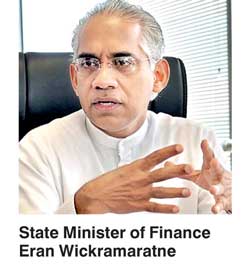Monday Feb 16, 2026
Monday Feb 16, 2026
Tuesday, 20 June 2017 00:00 - - {{hitsCtrl.values.hits}}
By Chathuri Dissanayake
In a bid to break policy stagnation, the Government yesterday outlined plans to simplify Sri Lanka’s tax regime with the introduction of a new Inland Revenue Act within the next two months which aims to retain only direct and value added tax while phasing out all other taxes. 
The move is aimed at bringing a stable business environment and policy consistency to encourage foreign investors. The reforms will also do away with tax holidays, imposing a blanket tax system on all business sectors save for a specified few, State Minister of Finance Eran Wickramaratne told reporters at the United National Party (UNP) head office.
“We are trying to simplify the tax system. When the new tax policy is announced then the investors will be able to make decisions based on the policy as they know the tax system for the next four to five years. The new policy will bring in much-needed stability to the tax regime,” he said.
The new act, which was approved by the Cabinet of Ministers over a month ago, will be tabled in Parliament for debate within the next two months.
“There may be amendments approved during the debate. Everyone may not agree but once it is passed then the business community will know the policy to enable them to take decisions,” Wickramaratne noted. The Government has been roundly criticised for failing to end policy deadlocks that have been blamed for the country failing to attract significant investment.
With the introduction of the new policy, the Government aims to gradually do away with different, complicated taxes, Wickramaratne said, adding that tax on tax too will be avoided in the future.
The Government also plans to rejuvenate the Tax Appeals Commission to work in full capacity as soon as possible, the Minister said.
Currently the commission runs with only three members, when the full commission should have nine members in total, appointed into panels of three members. Currently there are 1,500 pending cases lodged with the commission.
“The sooner we do this it is better. It is a loss of time and value for the Government,” Wickramaratne said.
Speaking of the long-term reforms needed to promote economic growth and stability in the country, the Minister said that currently the biggest challenge faced by the Government is the low efficiency and productivity of the state sector.
As a remedy, the Government is taking steps to introduce the e-procurement platform as soon as possible, he said. The move is aimed at reducing corruption in the state sector as well, Wickramaratne explained.
The Sri Lanka Customs payments platform, which is currently restricted to only two state banks - Bank of Ceylon and People’s Bank- would also be extended to all other banks in the country he said.
Stressing the need to implement practical policies to enable rapid economic growth without following outdated economic principles, Wickramaratne reiterated that loss-making State-Owned Enterprises (SOEs) will have to be restructured.
“To meet the capital requirement in some of the entities we can go for public-private partnerships (PPP) or we can list them on the stock market. Other entities may simply need to be terminated. If the same is done by the private sector as well, the Government need not continue it to benefit a small number of people as all the people will then pay the price for the losses that a particular institution makes,” he said.